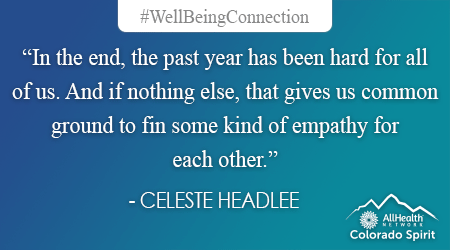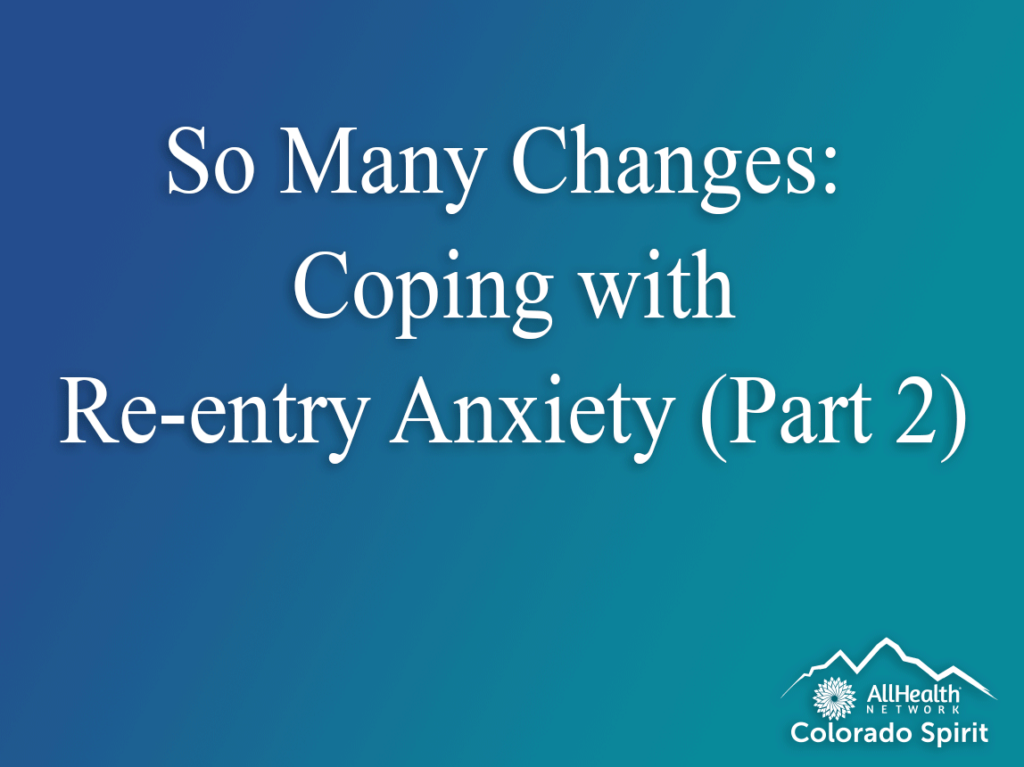Welcome to the Weekly Well-Being Connection! Each week we will share advice from our clinical experts on ways to care for your mental health and well-being throughout COVID-19.
Last week , we began diving into the topic of re-entry anxiety or re-entry fear and offered a few tips from a Psychological First Aid (PFA) lens about navigating transitions related to COVID. We wanted to return to the topic again this week, and explore some suggestions for building hope, taking action, and engaging connections as ways to support ourselves and help our community deal with the stress more change can bring.
Engage With Your Social Connections
As humans, we are social beings (even us introverts benefit from social connections!). While the relationship between social connections and resiliency is still being explored by researchers, there are already numerous studies that confirm social connections are crucial for health and well-being. The Colorado Spirit Team at AllHealth Network encourages you to consider ways in which your social connections can be useful during transitions. Some ideas are:
- Buddy up – whether it is returning to the office or venturing out to a crowded public space, we encourage you to think about making plans with someone for this adventure. Having someone to partner with often makes facing new and stressful situations feel a bit more manageable.
- Keep talking! Communicate with supportive others about how you are feeling. Are there things you are looking forward to? Things you are worries about? Are there things you might need from others? Communicating about this, asking for what you need, and using your connections as a sounding board can help with adjustments.
- Have grace with yourself if you are feeling rusty with in person socialization. You are not alone! As Celeste Headlee explains in an NPR interview , “Social skills are, after all, skills.” Many of us are a bit out of practice and might be feeling self-conscious about interacting. This is natural and completely understandable. We recommend checking out the interview for some suggestions about how to address this awkwardness.
Self and Community Efficacy/Taking Action
There is nothing like a global pandemic to highlight how little control we as humans have in different parts of our lives. Disasters of any kind disrupt our feeling of “being effective.” At the same time, finding ways to be effective and identifying parts of our lives, routines, and experience where we can exert influence often helps us tap into our resiliency. We also know that taking action can help counteract some of our bodies’ physical stress response. Towards the goal of finding your points of influence, our team offers these tips to help with re-entry worry:
- Focus on what you can control. Easier said than done we know. At the same time, when I am overwhelmed and stressed, I can easily spin into “what ifs” and “should haves.” This pattern of thought just takes me down the shame and guilt path and does not help me feel any better. Finding ways to focus on the action I can take often helps me make a small shift.
- Remind yourself of your past successes with resiliency. What we tell ourselves is important and shapes how our bodies experience stress (for a great exploration of this concept, we highly recommend Kelly McGonigal’s TED Talk – How to Make Stress Your Friend. By reminding ourselves of difficult situations we have faced and overcome, we are priming ourselves to look for success.
- Take some action. In general the longer we avoid things that are difficult, the more difficult those things become. We know anxiety can intensify with avoidance.
- Hold on to your gains! Make space to keep the things you have found helpful or enjoyed the past year. Just because we are returning to many pre-COVID activities, it does not mean we need to stop doing the things we have enjoyed this past year. If daily walks, dinner outside, or video calls with faraway friends have been enjoyable, place a priority on continuing to do these things.
Strategies for Building Hope
Dr. Lynn Rabb explains in When the World Feels Scary Cultivating Hope is an act of Resilience that “the most resilient people — those who can recover quickly from experiences of fear and move toward reasoned action — actively practice hope and optimism daily.” We highly recommend you check out her tips for actions to help build hope. We also offer a few more:
- Allow yourself to look forward to things and be excited for things.
- Consider your mindset as you re-enter various situations. If you are able to go into an event expecting it to be fun or positive, it can be easier to focus on the positive aspects of the experience and gain a little distance from the worry or concern we have. This article from the Wall Street Journal – How to Handle Your Re-Entry Anxiety as the Pandemic Recedes – expands on this concept and even adds the step of taking action to really savor the experience by mentally rehearsing it going well and then reflecting on the event afterwards.
While this is not an exhaustive list of all the strategies that might help with transitions and re-entry worry, we do hope it got you thinking of what you or others in your life might find helpful and supportive. Remember, the Colorado Spirit team is here to be a free support and resource whatever your individual situation is.

Would speaking to someone help?
To speak with someone in the Colorado Spirit Program about stress related to the pandemic, please call 720-707-6789 or visit our web page at www.allhealthnetwork.org/Colorado-Spirit
For information about other services at AllHealth Network or to get connected with ongoing behavioral health support, please call: 303-730-8858.
AllHealth Network is continuing to provide service via telehealth or by phone and our Crisis Walk-in Center remains open 24/7. To learn more about what other community mental health centers are doing, please visit The Colorado Behavioral Health Council COVID-19 website.
If you are experiencing a mental health crisis and are in need of immediate assistance, please call the Colorado Crisis Hotline at 1-844-493-TALK (8255) or text TALK to 38255.
Resource links
- Greater Good Magazine – Four Ways Social Support Makes You More Resilient
- The British Psychological Society – Resilience during uncertainty? Greater social connectedness during COVID-19 lockdown is associated with reduced distress and fatigue
- Self – Reentry Anxiety: 7 Ways to Deal With Stress About Post-Pandemic Life


